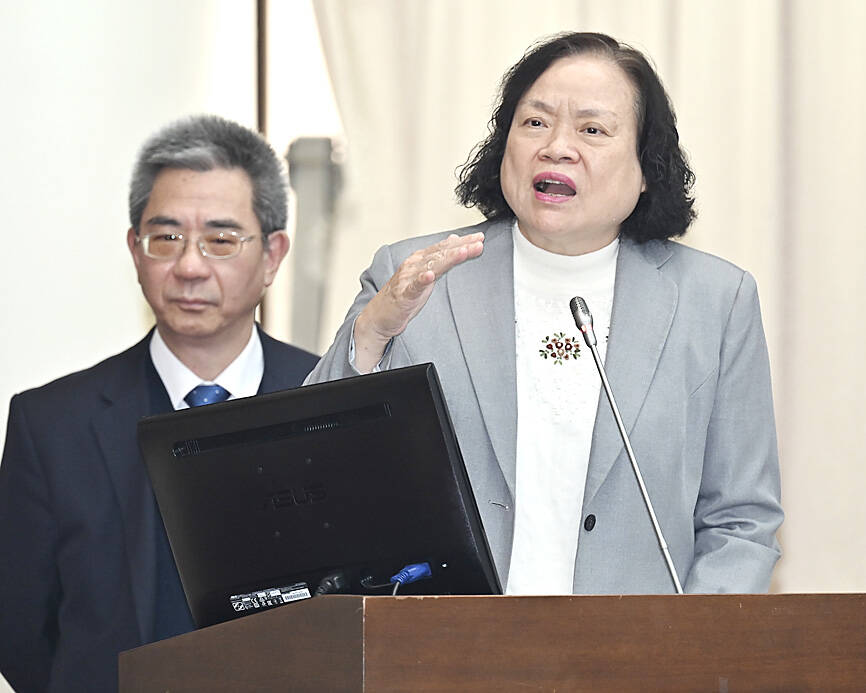A 37 percent reduction to all government projects would be necessary if controversial budget allocation amendments go into effect and the defense budget remains unchanged, Directorate-General of Budget, Accounting and Statistics (DGBAS) Minister Chen Shu-tzu (陳淑姿) said yesterday.
The legislature on Dec. 20 passed amendments to the Act Governing the Allocation of Government Revenues and Expenditures (財政收支劃分法) which would reallocate NT$375.3 billion (US$11.47 billion) of the central government’s budget to local governments.
It was the first time in more than 25 years that the Legislative Yuan had revised the act.

.Photo: Tu Chien-jung, Taipei Times
After deducting legally mandated expenses, the amendments could cut spending for programs — including the national defense budget — by up to 28 percent, Chen told a meeting of the legislature’s Finance Committee yesterday.
However, if cuts are not made to the national defense budget, funding for other projects, including rent and labor insurance subsidies, could be slashed by up to 37 percent, she said.
The central government’s legally mandated expenses for next year should be compiled and accounted for before cutting public spending, Taiwan People’s Party Legislator Chang Chi-kai said.
Currently, the central government is allocated 75 percent of the country’s total tax or other revenue, while local governments are given 25 percent of available funding. The amendments aimed to allow local governments return to the 60-40 percent allocation ratio before 1999.
Chinese Nationalist Party (KMT) Legislator Lin Te-fu (林德福) yesterday said that when President William Lai (賴清德) was Tainan mayor and Chen was in charge of the budget for the Tainan City Government, the city supported amending the act.
Chen said that at that time, Tainan had already reached its upper threshold for debt under the Public Debt Act (公共債務法) and struggled to pay wages, but the financial situation of all counties and cities have changed, with many now running a surplus.
The new amendments could impact major projects and policies of the central government, and create issues in compiling the 2026 fiscal budget, she said.
Next year’s central government budget is NT$3.13 trillion, about 58 percent of which is untouchable, leaving 42 percent, or NT$1.32 trillion, which would be cut by up to 28 percent, Chen said.
The cuts would make it difficult for important and ongoing projects to continue, impacting the budgets for national defense (NT$295 billion), labor insurance subsidies (NT$120 billion), rent subsidies (NT$40 billion) and projects addressing the low birthrate (NT$34.6 billion), Chen added.

South Korean K-pop girl group Blackpink are to make Kaohsiung the first stop on their Asia tour when they perform at Kaohsiung National Stadium on Oct. 18 and 19, the event organizer said yesterday. The upcoming performances will also make Blackpink the first girl group ever to perform twice at the stadium. It will be the group’s third visit to Taiwan to stage a concert. The last time Blackpink held a concert in the city was in March 2023. Their first concert in Taiwan was on March 3, 2019, at NTSU Arena (Linkou Arena). The group’s 2022-2023 “Born Pink” tour set a

CPBL players, cheerleaders and officials pose at a news conference in Taipei yesterday announcing the upcoming All-Star Game. This year’s CPBL All-Star Weekend is to be held at the Taipei Dome on July 19 and 20.

The Taiwan High Court yesterday upheld a lower court’s decision that ruled in favor of former president Tsai Ing-wen (蔡英文) regarding the legitimacy of her doctoral degree. The issue surrounding Tsai’s academic credentials was raised by former political talk show host Dennis Peng (彭文正) in a Facebook post in June 2019, when Tsai was seeking re-election. Peng has repeatedly accused Tsai of never completing her doctoral dissertation to get a doctoral degree in law from the London School of Economics and Political Science (LSE) in 1984. He subsequently filed a declaratory action charging that

The Hualien Branch of the High Court today sentenced the main suspect in the 2021 fatal derailment of the Taroko Express to 12 years and six months in jail in the second trial of the suspect for his role in Taiwan’s deadliest train crash. Lee Yi-hsiang (李義祥), the driver of a crane truck that fell onto the tracks and which the the Taiwan Railways Administration's (TRA) train crashed into in an accident that killed 49 people and injured 200, was sentenced to seven years and 10 months in the first trial by the Hualien District Court in 2022. Hoa Van Hao, a